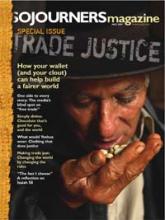During the 2005 Group of Eight summit, the United Kingdom-based anti-poverty group Christian Aid commissioned a massive mural in downtown Edinburgh, Scotland, that captures the David-and-Goliath inequalities built into our global trading system. Imagine a boxing ring in which a scrawny African boxer fights with one hand tied behind his back while a gigantic American boxer advances toward him. In the crowded stadium, men in fine business suits cheer for the American, holding up signs representing powerful multinational corporations, while the African boxer is supported by a smaller crowd of civil society organizers. Which boxer are you cheering for?
Impoverished countries in sub-Sahara Africa are $272 billion poorer because of "free trade" policies forced on them as a condition for receiving aid and debt relief, according to a 2005 report by Christian Aid. This lost income could have been used to wipe out all of Africa's debt and allow its children to be vaccinated and educated. Poor countries throughout the world face similar conditions.
There is a heated debate about what changes are needed in the global trading system to ensure that trade benefits everyone, particularly the most impoverished. Our trade structures are broken and need radical restructuring; the playing field has been rigged in favor of wealthy countries for so long that new rules must be created to allow poorer nations to compete as equal partners. Currently, donor countries and international lenders, such as the World Bank and International Monetary Fund, impose detailed conditions—such as privatizing water or electrical systems—onto countries as a condition for receiving aid or loans. Countries must be allowed more freedom to choose their own development strategies; they shouldn't have to forgo the care of their own citizens to satisfy the demands of wealthier countries.
Read the Full Article

